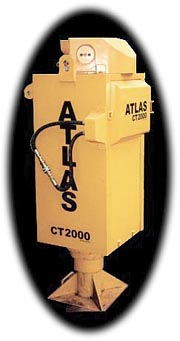
Faster penetration is a familiar refrain. “Obviously, the quicker you can get the hole in the ground, the better,” Purcell reminds. And the manufacturers are constantly reminded that contractors don't like downtime. “Trouble-free operation is of utmost importance - not having to open it up and service it or having to constantly change a ring here or a check valve there and things like that,” he says. “And good hole cleaning - the ability to deal with whatever kind of conditions you encounter and knowing that the hammer still is going to be able to clean its hole effectively and continue to drill like it should. Also, for water well drillers, the ability to deal with water volume when they encounter it and still be able to drill. The cost of drilling a hole is not going to go down. If you can get it into the ground quicker, you can reduce your costs that way.”
Asked about his opinion regarding near-term future advancements, Purcell offers, “Nothing too drastic. I don't want to give the impression that this is simple, but the basic concept is simple - the piston is hitting the bit and air is your operating medium and also your exhaust medium. I guess the things we probably will see are advances in metallurgy - in terms of getting the optimum life out of their tools in harder, abrasive conditions. Hard rock is great for hammers and it's great for hammer manufacturers. Everything runs very solid and tight, keeping everything in the hammer running exactly the way you want it. The process also tends to be abrasive by nature, so the manufacturers get to sell more product. In the softer rock, the hammers might last longer, but they tend to drill in the open position more than the fully closed position and that presents problems. So you want the metallurgy such that you can get the optimum life out of something from an abrasion standpoint and also that the heat treat can take the flex and distortion that go along with drilling in the softer formations and still maintain its integrity.”
As far as the guts of the hammers, Purcell says, “Everybody is going with less parts. Obviously, the fewer pieces that are in there, the less chance there is for something to break. Another thing some manufacturers are going to is a shorter tool and higher frequency. When something is shorter, it tends to be less prone to stresses.”
ND

Atlas Making Its Mark
Atlas Manufacturing Ltd. is a family-owned-and-operated company, with 43 years of successful drilling experience as water well contractors. The company developed a hydraulic casing hammer to use in its own drilling operations. In 1993, Atlas decided to leave drilling behind and diversify - a bold move that is working out nicely. The firm focused solely on manufacturing the patented Atlas Hydraulic Casing Hammers for both the air-rotary and cable-tool drill machines. Looking back, Atlas' sales manager Jody Anderson says, “It doesn't seem like a big deal now, but back then it sure was.” Anderson's brother Ken is president of the company and their father, Vaughn, is director. Atlas now also manufactures hydraulic lifting cylinders, swing jibs and latch mechanisms.“Our business has been growing steadily,” Anderson notes. “We offer six different hammer sizes for the rotary rigs and one each for cable tool rigs and augers. Our R-1000 and R-2000 hammers are our most popular products,” adding that, “recently we've been selling a lot of the R-5000 hammers. Basically, the majority of our customers are water well drilling contractors. We also do some business with environmental drillers. For the past five years, we've focused on North America, and mainly the U.S. - that's where the population is concentrated. We'd like to get into eastern Canada more and then on to Australia, New Zealand and Europe. Other markets are targeted but we've been so busy, we haven't been able to spread our wings enough to properly explore them just yet.”
Virtually all of Atlas' business is in new hammers. “We'll rebuild our own hammers but we don't take anyone else's on trade,” Anderson explains. “That's a very small part of our business - a 1 percent- or 2 percent-type thing. The only time we have trade-ins is when someone wants to trade up to a bigger model. And as soon as we get them, they're gone within a week.”
When asked what contractors are looking for from the hammer manufacturers, Anderson sums it up quite neatly: “As with anything else, people ideally want perfection. It's rather difficult to achieve perfection, but we all want to get as close as we can.” Fair enough.
The number one factor affecting the market right now? “Steel prices,” Anderson replies succinctly. “I hope that the price of steel comes back down but …” Another thing impacting business is this being an election year. “That seems to slow people down a bit. There's more of a wait-and-see approach going on along with that.”
Regardless of whatever happens in November, look for this relatively young company to continue to flourish.
Report Abusive Comment